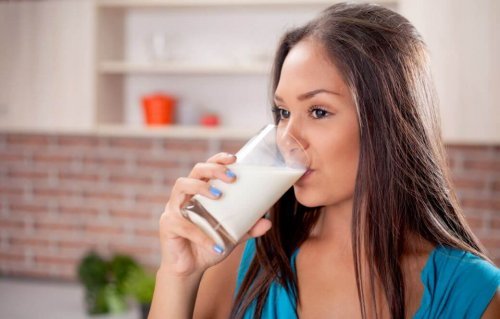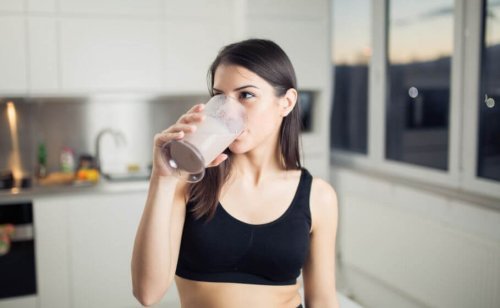Is it Good to Drink Milk Before Exercising?

Some claim that drinking milk before exercising gives you a great source of protein and helps achieve good results. Others say that we should consume milk after exercising to avoid feeling “heavy” and give our best at the gym. Find out which theory is the most accurate in this article.
Drink milk before exercising
Firstly, we’ll talk about the trend that suggests that drinking milk before exercising is appropriate. This is because any dairy product provides a good amount of protein. Making them an ideal choice to help you perform better at the gym or home.
Both milk and yogurt are great protein sources of biological value and are natural alternatives to the famous synthetic protein shakes (those prepared with powder and water). Casein and whey are essential for us when training.

Moreover, milk is a product formed largely by water, which favors hydration prior to exercise. We must supplement exercise with liquids, during and after the routine.
We could then say that milk fulfills two very important functions for an athlete: nutrition and hydration. Therefore, it serves to increase sports performance and achieve goals.
The contribution of proteins prior to training can help stimulate protein synthesis in muscles and reduce the degradations of fibers. This means that on the one hand, they help us have more strength and resistance and on the other, they accelerate the recovery process after the workout.
By drinking milk, we also ingest sugars that go directly to the blood, which will increase our physical resistance.
Additionally, having a milkshake and a piece of fruit a few hours before going to the gym will give us everything we need in terms of nutrients. Besides a dose of protein, this gives us vitamins A, B2, B12, D, and calcium.
Drink milk after exercising
For the opposite argument, we find those who claim that drinking milk after exercising is the right decision. Why? Basically, because these foods take a long time to digest and that stimulates the body to produce mucus. This can prevent good sports performance.

The view in favor of drinking milk following exercise states that it’s a good option if you want to recover muscles.
In turn, milk is a recommendable alternative to drink after training than before exercise. Mainly because it will allow you to recover lost fluids and carbohydrate reserves.
We shouldn’t ignore the fact that some people have problems digesting lactose. It makes them feel “heavy” for several hours after consumption. This is another reason why it would be better to drink after training and not before; assuming you want to perform better and avoid nausea and vomiting.
In short, the problem doesn’t lie in the milk itself, but in other issues such as the amounts (half a cup isn’t the same as a pint) and the time between the intake and exercise. If you want to take advantage of the benefits of dairy products to train better and hydrate beforehand, we recommend that you consume milk at least two hours before going to the gym.
You must bear in mind that many of the nutrients you obtain will no longer be available when you finish the routine. Therefore, in order to take advantage of post-workout benefits, a second serving of milk should be taken at least one hour after physical effort.
If you feel that milk is too heavy or that it leaves you in a state of lethargy after ingesting it, then it would be best to leave your consumption for when your return home after exercising. This way, you will recover faster, hydrate well, and take advantage of the benefits without indigestion.
Some claim that drinking milk before exercising gives you a great source of protein and helps achieve good results. Others say that we should consume milk after exercising to avoid feeling “heavy” and give our best at the gym. Find out which theory is the most accurate in this article.
Drink milk before exercising
Firstly, we’ll talk about the trend that suggests that drinking milk before exercising is appropriate. This is because any dairy product provides a good amount of protein. Making them an ideal choice to help you perform better at the gym or home.
Both milk and yogurt are great protein sources of biological value and are natural alternatives to the famous synthetic protein shakes (those prepared with powder and water). Casein and whey are essential for us when training.

Moreover, milk is a product formed largely by water, which favors hydration prior to exercise. We must supplement exercise with liquids, during and after the routine.
We could then say that milk fulfills two very important functions for an athlete: nutrition and hydration. Therefore, it serves to increase sports performance and achieve goals.
The contribution of proteins prior to training can help stimulate protein synthesis in muscles and reduce the degradations of fibers. This means that on the one hand, they help us have more strength and resistance and on the other, they accelerate the recovery process after the workout.
By drinking milk, we also ingest sugars that go directly to the blood, which will increase our physical resistance.
Additionally, having a milkshake and a piece of fruit a few hours before going to the gym will give us everything we need in terms of nutrients. Besides a dose of protein, this gives us vitamins A, B2, B12, D, and calcium.
Drink milk after exercising
For the opposite argument, we find those who claim that drinking milk after exercising is the right decision. Why? Basically, because these foods take a long time to digest and that stimulates the body to produce mucus. This can prevent good sports performance.

The view in favor of drinking milk following exercise states that it’s a good option if you want to recover muscles.
In turn, milk is a recommendable alternative to drink after training than before exercise. Mainly because it will allow you to recover lost fluids and carbohydrate reserves.
We shouldn’t ignore the fact that some people have problems digesting lactose. It makes them feel “heavy” for several hours after consumption. This is another reason why it would be better to drink after training and not before; assuming you want to perform better and avoid nausea and vomiting.
In short, the problem doesn’t lie in the milk itself, but in other issues such as the amounts (half a cup isn’t the same as a pint) and the time between the intake and exercise. If you want to take advantage of the benefits of dairy products to train better and hydrate beforehand, we recommend that you consume milk at least two hours before going to the gym.
You must bear in mind that many of the nutrients you obtain will no longer be available when you finish the routine. Therefore, in order to take advantage of post-workout benefits, a second serving of milk should be taken at least one hour after physical effort.
If you feel that milk is too heavy or that it leaves you in a state of lethargy after ingesting it, then it would be best to leave your consumption for when your return home after exercising. This way, you will recover faster, hydrate well, and take advantage of the benefits without indigestion.
All cited sources were thoroughly reviewed by our team to ensure their quality, reliability, currency, and validity. The bibliography of this article was considered reliable and of academic or scientific accuracy.
Cribb, P. (2011). Las proteínas del suero de leche de los estados unidos y la nutrición en los deportes. Research Scientist, BioDeakin, Deakin University.
This text is provided for informational purposes only and does not replace consultation with a professional. If in doubt, consult your specialist.








